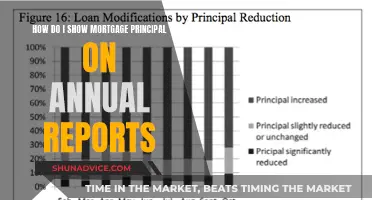
There are several reasons why someone may want to pause their mortgage payments. These include unemployment, a change in income, or unexpected expenses. While it is possible to pause mortgage payments, it is not advisable to do so without first considering other options. It is important to contact your lender or a financial advisor to discuss your specific situation and explore alternative solutions. Additionally, it is crucial to understand that pausing mortgage payments is typically a short-term solution and that interest may continue to accrue during this period, increasing the overall amount owed.
What You'll Learn

How to pause mortgage payments for three months without major credit impact
If you are unable to pay your mortgage, it is important to act quickly to avoid missed mortgage payments and prevent damage to your credit score. Here are some options to pause or reduce your mortgage payments for three months without majorly impacting your credit:
Contact your lender
Get in touch with your loan servicer as soon as possible to discuss your options. They will be able to advise you on the best course of action based on your situation. It is best to call well before your payment is due so you can give yourself more time to come up with a solution. Don't be afraid to call multiple times until you reach someone who can help.
Mortgage forbearance
If you are experiencing temporary financial hardship, you can ask your lender about mortgage forbearance. This option helps homeowners avoid foreclosure by temporarily reducing or pausing mortgage payments for a short period, usually up to 12 months. You will need to show evidence of your financial hardship, and you will still need to repay the missed payments at the end of the forbearance period.
Loan modification
If you are worried about affording payments in the future, a loan modification may be a better option. This would involve permanently changing the terms of your loan to lower your monthly payments, usually by extending the length of the loan. This means the loan will cost you more in interest payments over time. Lenders are under no obligation to grant loan modifications and typically do so for customers with strong credit who can show they will be able to keep up with payments under the new terms.
Explore other options
While pausing your mortgage payments may provide temporary relief, it is important to explore other options to manage your finances. This could include applying for unemployment benefits, using food banks, or taking on additional sources of income such as childcare. It is also recommended to have an emergency fund of 3-6 months' worth of expenses to help cover unexpected costs.
Understanding Mortgage Debt: Strategies for Homeowners
You may want to see also

Loan modifications to help those unable to make payments
If you are unable to make your mortgage payments, loan modifications can be a helpful solution. Loan modifications involve renegotiating the terms of your loan with your lender to make the payments more manageable. Here are some important things to know about loan modifications:
Types of Loan Modifications
There are several types of loan modifications that your lender may offer, depending on your circumstances. These can include:
- Stepped Mortgage: This option slowly increases the interest rate over time, making your initial payments more affordable.
- Principal Reduction: The bank may reduce the principal amount you owe, lowering your monthly payments.
- Interest-Only Loan: Shifting to an interest-only loan for a short period can make your repayments more manageable.
- Repayment Suspension: This option allows you to pause your repayments for a period of time, usually up to six months. However, interest may still accrue during this period, increasing your overall debt.
Applying for a Loan Modification
Applying for a loan modification typically involves the following steps:
- Contact Your Lender: Reach out to your lender directly to discuss your financial situation and explore possible solutions, including loan modification options.
- Gather Financial Records: Most lenders will require you to provide financial records, such as pay stubs, bank statements, and monthly expenses for the past six months, to evaluate your eligibility for a loan modification.
- Understand the Process: Each lender has its own application system and requirements for loan modifications. Carefully review the information on the bank's website or consult a financial advisor to understand the specific steps and criteria for approval.
- Make Required Payments: During the loan modification process, continue to make any required payments in full and on time to avoid disrupting the modification process.
Considerations
While loan modifications can provide temporary relief, it's important to carefully consider your options before proceeding:
- Explore Other Alternatives First: A loan modification may have long-term implications for your loan, so it's recommended to explore other options first, such as accessing savings or offset accounts, or seeking independent financial advice.
- Interest Accumulation: Keep in mind that interest may continue to accrue during any period of paused payments, which can significantly increase the total amount you owe over time.
- One-Time Option: Lenders typically only offer one opportunity for a mortgage pause, so be certain that you've explored all other options and are prepared to recommence repayments after the pause period ends.
- Long-Term Strategy: Even with a loan modification, maintain a long-term strategy for paying off your mortgage. Modifications can provide temporary relief, but they may not be a sustainable solution without an overall financial plan.
Making Mortgage Payments: Wells Fargo Guide
You may want to see also

How to pause an FHA mortgage for 12 months
There is a way to pause an FHA mortgage for 12 months, but it is not as simple as some viral videos may have led you to believe. The videos in question refer to the FHA's 203(k) Rehabilitation Mortgage Program, which allows buyers to purchase a fixer-upper and make renovations before their first bill is due. This program can excuse buyers from paying their mortgage for up to 12 months, but only if certain criteria are followed.
Firstly, you will need to be pre-qualified for the loan. This type of loan is only available to buyers of fixer-uppers, and the property must be uninhabitable for the monthly payments to be deferred. The program allows up to 12 months for renovations to take place and can finance up to 110% of the home's after-repair value.
It is important to note that the payments are not paused; they are still owed and will be added to the total loan amount. This means that interest will accrue, and you will end up paying more over time. As title and escrow expert Alan Chang warns, "This doesn't mean that payments can be skipped for a year." Therefore, it is important to have a long-term strategy for paying off the mortgage and not to rely on this pause as a solution to financial difficulties.
If you are considering this option, be sure to do your research and seek expert advice to understand the full implications and ensure you are following the correct procedure.
Mortgage Freedom: Marking Your Loan as Paid Off
You may want to see also

How to pause a mortgage application
If you are unable to pay your mortgage, you may be able to pause your mortgage application by applying for mortgage forbearance. This is a temporary arrangement that allows homeowners to pause their monthly mortgage payments to avoid late fees or loan default. It is important to note that forbearance does not forgive or reduce the amount you owe on your mortgage, and you will be required to repay any missed or reduced payments with interest.
To apply for mortgage forbearance, you should contact your mortgage lender or servicer and explain your situation. They may require you to fill out an application and provide documentation, such as income and financial records, to determine your eligibility. If your request is approved, your lender will provide you with a statement outlining the terms of your forbearance, including the duration of the forbearance period and the repayment options.
It is important to carefully consider the benefits and potential risks of mortgage forbearance before deciding if it is the right option for you. While it can provide temporary financial relief and help you avoid foreclosure, it may also have negative consequences for your loan, home, and credit score. There may be other alternatives to forbearance, such as loan modification or refinancing, that may be more suitable for your situation.
Additionally, there are other resources available to help you if you are struggling to pay your mortgage. Federal agencies like the Consumer Financial Protection Bureau and nonprofit counseling agencies like the National Foundation for Credit Counseling® can provide tools and programs to help prevent foreclosure. You can also contact a housing counselor approved by the U.S. Department of Housing and Urban Development for guidance and assistance.
Generate Mortgage Leads: Strategies for Success
You may want to see also

Strategies to pay off the mortgage over time
It is important to remember that paying off your mortgage early can have several benefits, including saving money on interest and increasing your financial stability. However, it is also essential to consider the potential drawbacks, such as having less money for retirement savings or your children's education. Additionally, some mortgage companies may charge a prepayment penalty for paying off your mortgage too early. Thus, it is crucial to assess your financial situation and priorities before deciding on a strategy to pay off your mortgage over time.
- Make extra mortgage payments: If your lender does not charge a penalty for early repayment, you can make extra payments towards your principal balance. Ensure that you inform your lender that you want these extra payments to be applied to the principal and not towards future monthly payments. Making an extra payment each year can significantly reduce the term of your loan and the total interest paid.
- Shorten your loan term: When refinancing your mortgage, you may be able to negotiate a shorter loan term with your lender. While this may result in larger monthly payments, a shorter-term loan will help you pay off your mortgage faster and save money on interest.
- Round up your monthly payments: Consider rounding up your monthly mortgage payments to the nearest $100. For example, if your payment is $860, round it up to $900. Over time, this strategy can help you pay off your mortgage faster and reduce the term of your loan.
- Put your extra income towards your mortgage: If you receive bonuses, raises, or other forms of extra income, consider putting this money towards your mortgage. This strategy can help you make a dent in your principal balance and pay off your mortgage faster.
- Create a budget and stick to it: Start by creating a monthly budget and identifying areas where you can cut back on expenses. Redirect the savings towards your mortgage payments. This may involve making some sacrifices and resisting the temptation to increase your spending as your income grows.
Remember, it is always a good idea to consult with a financial expert or advisor before making significant decisions regarding your mortgage or other loans. They can help you assess your unique financial situation and provide personalized advice.
Making Overpayments on Your Barclays Mortgage: A Guide
You may want to see also
Frequently asked questions
Contact your lender or a financial consultant to discuss your options. You may be able to pause your mortgage for up to six months, but this is usually only offered in emergencies and you will only get one shot at it.
Interest will continue to accrue and be added to your loan balance, meaning you will pay more in the long term.
Yes, you could consider moving to an interest-only loan, or dipping into your savings.
Yes, but it depends on your vendor and if they are willing to wait. You will need to be able to prove that you will have all the money in time.







